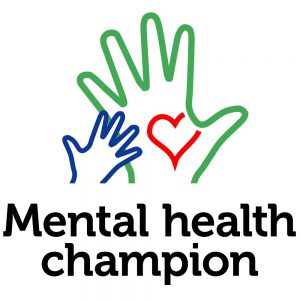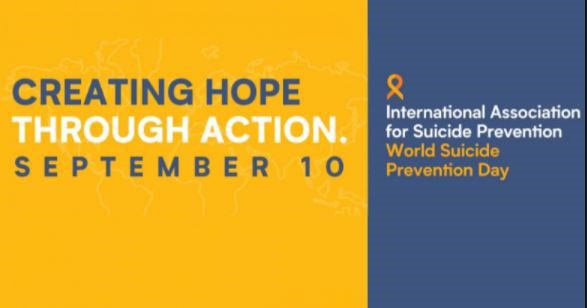I must start this month’s blog with a bit of a plug. It was absolutely fantastic to see the very first advertisement for the recruitment of ‘Mental Health Champions’ that went out in Achieve together’s communications last month. It’s so exciting to be part of this new venture and I’m really looking forward to working with those of you that are chosen as ‘Champions’. This is just the start of a much bigger plan to support mental health within the organisation, and I’m really proud to be part of it.

On the 10th September it is World Suicide Prevention Day and every year organisations and communities around the world come together to raise awareness of how to create a world where fewer people die by suicide. This year’s theme, which will be the theme until 2023, is ‘Creating Hope Through Action’, which aims to empower people with the confidence to engage with the complexity of ‘hope’.

Every year the campaign including the ‘Samaritans’ involves 70 other suicide prevention and mental health groups, under one group known as ‘National Suicide Prevention Alliance’ (NSPA). If you want to find more information and get involved in the NSPA. Click here for the link.
The Samaritans in particular are asking people to share the things that they do which help them feel hopeful when they’re going through a difficult time. For example:
• Reaching out for a coffee with my best mate
• Taking a walk in the fields and letting the wind blow everything away
• Going for a run along the seafront
The latest suicide rates for England and Wales showed there were 5,691 suicides in 2019, which is 321 more compared to the year before. That’s 11 deaths per 100,000 people, and around three-quarters of these deaths were men.
Some trends emerging from these statistics showed that men aged 45-49, and women aged 50-54 had the highest rates, and that females under the age of 25 had dramatically increased by over 93% since 2012.
I wonder with some dread what effect the pandemic will have had on the next figures.
Those of you that have attended my mental health awareness training sessions may have seen a video that I use during the session about a man that jumped off the Golden Gate Bridge and survived. He tells his story and talks about all the many things that went through his mind before he jumped off the bridge. He talks about all the people that saw him in distress and that they did nothing – he also discusses that it would have just taken just one of those people to ask him if he was Ok, and that this would have been enough to stop him jumping off the bridge. It’s quite impactful, but also tells the sad reality that very few people care or want to get involved. We need to raise awareness of this and try to change these attitudes.
Here’s the video if you want to watch it.
There are lots of myths about suicide, and by understanding these facts it can help you to help someone struggling to cope.
Myth: People who talk about suicide aren’t serious and won’t go through with it.
Fact: People who kill themselves have often told someone that they do not feel life is worth living or that they have no future. Some may have actually said they want to die.
It’s possible that someone might talk about suicide as a way of getting attention, in the sense of calling out for help.
It’s important to always take someone seriously if they talk about feeling suicidal. Helping them get the support they need could save their life.
The majority of people who feel suicidal do not actually want to die – they do not want to live the life they have.
Myth: If a person is serious about killing themselves then there’s nothing you can do.
Fact: Often, feeling actively suicidal is temporary, even if someone has been feeling low, anxious or struggling to cope for a long period of time. This is why getting the right kind of support at the right time is so important.
Myth: You have to be mentally ill to think about suicide.
Fact: 1 in 5 people have thought about suicide at some time in their life. And not all people who die by suicide have mental health problems at the time they die.
However, many people who kill themselves do suffer with their mental health, typically to a serious degree. Sometimes it’s known about before the person’s death and sometimes not.
Myth: People who are suicidal want to die.
Fact: The majority of people who feel suicidal do not actually want to die; they do not want to live the life they have. The distinction may seem small but is very important. It’s why talking through other options at the right time is so vital.
Myth: Talking about suicide is a bad idea as it may give someone the idea to try it.
Fact: Suicide can be a taboo topic. Often, people who are feeling suicidal don’t want to worry or burden anyone with how they feel and so they don’t discuss it.
But, by asking someone directly about suicide, you give them permission to tell you how they feel. People who have felt suicidal will often say what a huge relief it was to be able to talk about what they were experiencing.
Once someone starts talking they’ve got a better chance of discovering options that aren’t suicide.
Myth: Most suicides happen in the winter months.
Fact: Suicide is complex, and it’s not just related to the seasons and the climate being hotter or colder, and having more or less light. In general, suicide is more common in the spring, and there’s a noticeable peak in risk on New Year’s Day.
Myth: People who say they are going to take their own life are just attention seeking and shouldn’t be taken seriously.
Fact: People who say they want to end their lives should always be taken seriously.
It may well be that they want attention in the sense of calling out for help, and helping them get support may save their life. (Source Samaritans).
You don’t have to be a qualified counsellor, sometimes all it takes is someone to listen non-judgmentally, and to be there and show you care.
If you need support or someone you care about needs support the Samaritans have a free confidential helpline that’s available 24hours a day just call 116 ,123 or SMS: Text SHOUT to 85258 and someone will be in touch.
If you want to share your stories of your own particular experience of mental health and what has helped you, it would be great to hear from you, or if you would like to contribute to the blog you can reply directly or e-mail me on shirley.allmark@achievetogether.co.uk
It would be great to hear from you.
In the meantime enjoy the outdoors and stay safe.
Shirl

I have been a mental health nurse for 28 years. I work in the Health and Wellbeing Team, and my main role is to facilitate mental health and related subjects. I also facilitate epilepsy and emergency rescue medication training. I provide support and consultations to managers and teams supporting individuals with complex needs and mental health difficulties. This blog is written to encourage people to start talking about mental health, in order to raise awareness and reduce stigma.

